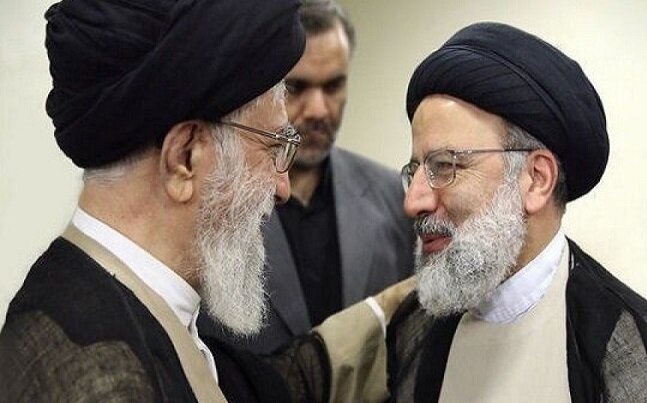Iran President Ebrahim Raisi (L) with Supreme Leader Ali Khamenei (File)
Iran’s regime blocked the imminent renewal of the nuclear deal with the 5+1 Powers (US, France, Germany, UK, China, and Russia) in summer 2021, according to “two sources close to the negotiations”.
The sources told Middle East Eye that the agreement over the 2015 deal — damaged by the Trump Administration’s withdrawal in 2018, followed by comprehensive sanctions on Iran, and by Tehran’s breaking of the terms with enrichment of uranium to 20% and then 60% — was on the table when President Ebrahim Raisi took office in August 2021.
The diplomats carrying out the Vienna talks under Raisi’s predecessor, Hassan Rouhani, “offered to allow their negotiators to travel to Vienna to sign the agreement”, said one official. The Rouhani camp offered to take responsibility — and thus absorb any backlash from hardliners — saying “the country and your government could reap the economic benefits of the JCPOA [Joint Comprehensive Plan of Action]”.
Raisi was open to completion of the agreement, said the sources: “[He] initially accepted this offer and told them to finish the job in two or three meetings.” However, he “changed his mind” when “people close to him” undermine any acceptance.
The officials do not name the Supreme Leader, whom most analysts see as the ultimate decison-maker in Iran. Instead, they refer to the objections of Ali Bagheri Kani, Tehran’s lead negotiator in Vienna, and senior Revolutionary Guards official Ali Hossein Taash.
Bagheri Kani insisted that time was on Iran’s side and talks could be prolonged.
Dormant Talks, Ramped-Up Iran Nuclear Production
In March 2022, amid reports that a deal was again close to completion, Iran insisted that the US remove the Revolutionary Guards from its list of “foreign terrorist organizations”.
Tehran eventually dropped the condition, but then demanded strict limits on inspections of its nuclear facilities by the International Atomic Energy Agency.
Iran began the enrichment of 60% uranium, which can potentially be further enriched to a military grade of more than 90% for nuclear weapons. The 2015 deal had restricted Tehran to 3.67% production, with all 20% stock to be removed from the country.
At the same, Iranian authorities restricted inspections and confiscated all video from the IAEA’s monitoring cameras, some of which were later removed.
The IAEA Board of Governors has censured Iran over its actions. Tehran responded by stepping up the production of 60% uranium. Iran continues to restrict the monitoring, and discussions with IAEA head Rafael Grossi have not produced any sign of a breakthrough.
See also Will Iran Lift Its Restrictions on Nuclear Inspections?


Strike Movement Spreading in Iran over Wages, Living Conditions
https://iranwire.com/en/news/115905-strike-movement-spreading-in-iran-over-wages-living-conditions/
Iranians To Form Human Chains To Protect Schools From Gas Attacks
https://www.iranintl.com/en/202304240420
HRW Accuses Iranian Security Forces Of Torturing, Killing Children
https://www.rferl.org/a/iran-torture-children-crackdown-human-rights-watch/32378370.html
The real blocker to the JCPOA is the United States’ dysfunctional politics. The nuclear deal never had bipartisan support and that is what doomed it. If some Republicans had been on board, Obama could have got Congress to pass the deal into law. Instead they passed an oversight bill that Trump exploited to justify leaving the JCPOA. Iran has probably calculated that a Republican will win in 2024 and so there is no point in going back into the deal unless it receives ironclad guarantees that the United States will face a real cost if it were to unilaterally pull out again. The JCPOA has its critics in Iran but that is largely based on mistrust of the United States. The deal required Congress to eventually remove sanctions permanently something that it would never do.
“The nuclear deal never had bipartisan support and that is what doomed it…”
Typical bullshit of yours, all parties in iri supports the nuclear deal? Those who are profiting from sanctions will never let their golden goose go….
“The officials do not name the Supreme Leader, whom most analysts see as the ultimate decison-maker in Iran.”
This is how the constitution of the Islamic Republic frames it in Article 1760: https://www.constituteproject.org/constitution/Iran_1989.pdf
“The decisions of the Supreme Council for National Security shall be effective after the confirmation by the Leader.”